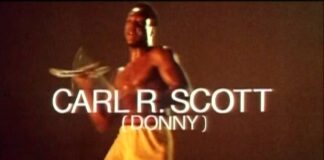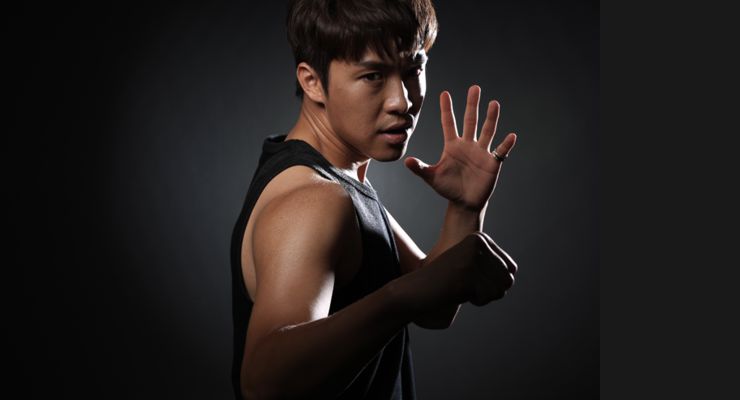 In 2008, Jack Tu earned the singular honor of becoming Jackie Chan’s disciple. This was after winning a popular reality TV show contest that captivated Chinese viewers as one of the many preludes to the Beijing Olympic Games. I had the chance to catch up to Jack in early March 2013 as he came back to California and celebrated his birthday with his family. Coincidentally, thanks to Facebook, Jack and I discovered we actually share birthdays.
In 2008, Jack Tu earned the singular honor of becoming Jackie Chan’s disciple. This was after winning a popular reality TV show contest that captivated Chinese viewers as one of the many preludes to the Beijing Olympic Games. I had the chance to catch up to Jack in early March 2013 as he came back to California and celebrated his birthday with his family. Coincidentally, thanks to Facebook, Jack and I discovered we actually share birthdays.
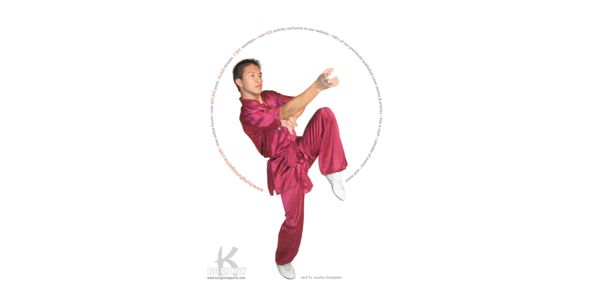
GC: So what did you do for our birthdays?
JT: Um. Nothing. Just training.
GC: (laughs) You know, I had the opportunity to spend the weekend with your family a few weeks ago at Extraordinary Martial Artists of the World Lunar New Year Gala in Canada. Your sisters have both grown into beautiful women who bend steel bars on their throats. Your brother’s upper body development is freaking huge. And don’t even get me started on your dad. What was it like growing up in a martial arts family?
JT: There’s not really much of a special feeling about looking out there and looking at a “normal” family.
GC: (laughs) It’s a stretch to think of your family as normal. No offense, but…
JT: Yeah, well, like in the past, there would be no holidays. There would be no, like, break or vacation. It was just basically training. If there’s no school, then there would be training.
GC: How much are you training nowadays?
JT: Now? Not much. It’s just in the afternoon or in the morning. It’s not morning, afternoon and night anymore.
GC: You’re living in China now?
JT: Yeah, I live in Beijing now.
GC: How is life in China versus life in America for you now?
JT: In China, it seems more rushed. There’s lots of stuff to do in China. There’s never a time just for myself. In China, there’s a lot of social life – like you have to meet this person, that person. There will be no weekends. On the weekends, there’s lots of stuff to do. Back in the U.S. it’s more relaxed. It feels like it’s more time for myself.
GC: How long have you been in Beijing now?
JT: Four years.
GC: That city is booming now. What changes have you seen?
JT: Oh, in the past, Beijing was like all the buildings were unfinished. It’s not done. I think it was changed after the Olympics. Before the Olympics, the city was more ancient and modern mixed together because they had ancient buildings, the old rooftops, you know, the Forbidden City. But now, new Beijing is more like Shanghai now. It’s evolving into a diverse city with so many night activities.
GC: Why don’t you catch our readers up on the film and television projects you’ve been doing lately.
JT: Ah, the film I just finished is Jackie Chan’s Police Story 2013. In that story, there’s not a lot of fighting action. There’s lots of shooting, police and military involved in this.
GC: Now this is not a sequel to the original Police Story franchises. It’s a whole new thing, right?
JT: It’s a lot different than the old one because this one takes place in Beijing in winter. All the cops and all the police are China policemen. It’s kind of unique. It’s fun because they used the real cops and special forces. All the policemen, special forces and firefighters are all real policemen, special forces and firefighters. I’m one of them, but I play a sniper. My character was fun. At the end, I go in and save him. The story, well, I can’t really tell the story. They keep it secret. But it’s different. This is about a father and a daughter. And it’s about family. It’s about the dad going to this club and saving his daughter, and involving a whole gang and police.
GC: Now, you also just did a television series, right?
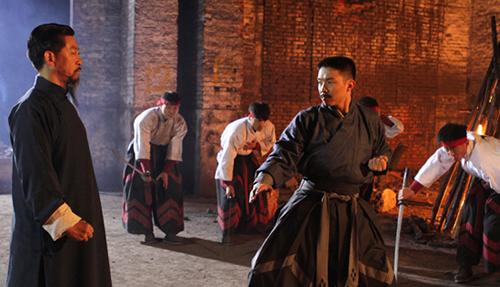
JT: It’s called, if I translate it, it’s called Sparrow Number 3 (Yanzi Lisan). It’s based on a real story from the past. It’s about a person who had really good martial arts and he’s working as a thief. He’s stealing wealthy people’s money and then giving to the poor.
GC: A Robin Hood character.
JT: Yeah. It takes place around the Japanese invasion. This story is based on a real person and there’s an old version of this drama. It was ranked Number 1 in China in the past, like most viewed drama in China. It was filmed by Shandong Television. So Shandong TV said, “Hey, we want to do this TV series again.” For the new one, they want all the people they have in it to know martial arts. It will be on in August.
There was one character in there. His name was Liu Xiao Ling Tong (a.k.a. Zhang Jinlai). He’s the original actor for the Monkey King TV series in China. Also there’s one actor that’s from…there was this movie where Sammo Hung was trying to push these two young actors. It’s called Wushu something…Wushu xiao nian xing…
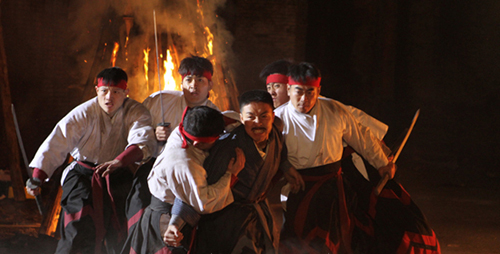
GC: Wasn’t that just called Wushu in America? Came out just a few years ago?
JT: I think so. It was out in 2009 or 2008.
GC: Yeah, it’s about some modern wushu competitors from a wushu school in China.
JT: Yeah, that’s the movie. One of the actors from that movie is in this TV series.
Before I go on this TV series, they were saying, “Hey, we want you to be on this TV series.” I said, “Okay, what kind of character do I have?” “A Japanese warrior.” “Okay, so what kind of Japanese warrior?” “We’re not sure yet, but are you interested?” I was like, “Okay, I’ll try.” And then when I get the script, it has the old version of this Japanese warrior and he’s kind of like the character they make fun of.
GC: The comic relief.
JT: Yeah, yeah, the comedian one. I was looking at the script disappointed and was like, “Ah, it feels weird. I don’t know how I can play this character well. Can we make this character more interesting?” And the director’s like, “Okay, but we want to see how is your martial art. We’re still not sure about your martial arts. What can you do in this?” “Okay, so what can I do?” He was like, “Okay, we’re going to film one big fighting scene for these three days. Just you and Liu Xiao Ling, the Monkey King. I said, “Okay!”
And so we filmed for three days. The first day, they were making movements for me. And because in China now, there’s a lot of action directors and stuntmen that only do wushu. They don’t do Taekwondo or Karate. They have never seen those other martial arts before. And they were doing all the wushu movements for a Japanese warrior. I was like, “Why would a Japanese warrior do outside kicks? This doesn’t feel right.” The action director is called Shang Lin. He’s Yuen Kwai’s student. He did Transporter and lots of Hollywood movies.
GC: He’s known as Corey Yuen in Hollywood.
JT: Yeah. And he looked at me and asked me, “You know other martial arts?” I said, “Yeah, I’ve seen them and I practice most of them.” He said, “Okay, for this part, you choreograph it yourself.” I was like, “Are you sure?” He said, “Yeah.” I started choreographing all of my movements and also all of my opponent’s movements. And I’ve given each character a signature movement, like this signature movement is their killing movement and it will never be seen on any other movies or TV series. I used Jujitsu and Judo and mixed those Karate movements, but then making them faster, making them more unique. The director saw the first scene. They just looked and called me in and said, “Okay, so now we have an idea what we’re going to make you into.” I was like, “What?” “We’re going to make you the strongest character in this TV series.” “Really?” “From now, you choreograph all your movements and we’ll add more scenes into it.”
It was pretty fun. It’s going to be a total of thirty episodes and I will be in there for eleven to twelve episodes. Most of the fighting scenes are done in one shot. Most TV series and movies are too fake now. The character can’t fight so they have to cut each movement. I was like, “No.” For me, if the camera is on me, I want to put it on from the beginning to the end. I want to take the action movie into the next level. Most of the scenes in this TV series are going to be one shot.
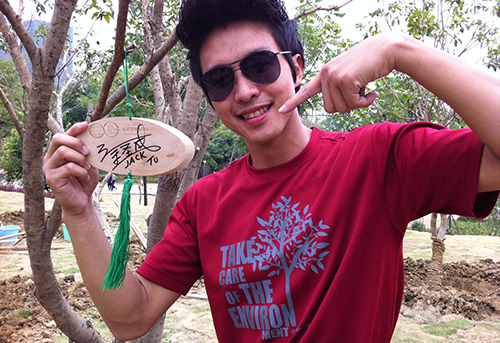
GC: Very good! How was doing choreography for you?
JT: It was fun. I added a lot of little tricks into it. I was also being a cameraman too. I’ve been staying with Jackie for a long time and I know how they film action films. Basically, no risk. It’s not real. Everything is just by angles. Maybe a punch looks so real. Maybe a kick wasn’t so high. But we can make the kick look so high. For three or four years I’ve been learning this from Jackie, so I’m used to it in these kinds of TV series. They were like, “Wow, oh, these are movie shots.” I was like, “Yeah, let’s make a movie in the TV series.”
GC: That seems to be the trend with cable TV here nowadays.
JT: In China, it’s not like that because they are still sticking with the old ancient style of filming.
GC: Right. Chinese TV series cinematography is pretty stale. I look forward to seeing this. I hope it makes it to America.
So you’ve been Jackie’s disciple now for half a decade – has it lived up to your expectations?
JT: Well, I can’t say I’m the only one who came out to do TV series and movies, and then directing my own movements, my own action. The rest of the people now, they kind of want to move into just singing and dancing.
GC: You mean the rest of the finalists from the Jackie Chan’s Disciple competition. The “New Lucky Seven.”
JT: Yeah. For now, they don’t have a sense of action.
GC: You’re the only really martial one.
JT: Yeah.
GC: Now that you know Jackie really well, what do you think is America’s biggest misconception of him?
JT: What do you mean by “misconception”?
GC: What do you think Americans don’t understand about Jackie? Jackie in Asia – what he means, what he represents, how he is viewed – is very different than in America.
JT: Well, I think Americans just think Jackie Chan is a funny character, that he’s humble and everything is just by luck. But in China, he’s a huge symbol representing the country. He also sings. He has his own albums. He creates those national songs, like for country and for nation.
GC: Patriotic songs.
JT: Yeah, yeah, yeah. He’s very patriotic. He loves his own country. Wherever he goes, he’s like, “In China…” and “I’m Chinese!” For me, China, to be honest, is very messed up now. It’s a place where poor and wealthy, the distance is very far away. The wealthy can be very wealthy. The poor can be very poor. There’s no middle-class people. What I’m saying, what’s Jackie’s dream now, he’s trying to make everyone equal. He’s doing lots of charity and he’s helping lots of people. There’s one thing that’s so funny about him. His son, Jaycee, has a US passport. He wants his son to quit his US passport and get a China one. But this is just how much he loves his country, how much he loves his origins. He really wants to see his origins be strong.
Also, he’s doing this within his movies too, with Chinese Zodiac 12, saving the country’s treasures and bringing it back to China. Recently, he’s been involved with Chinese politics. I don’t know about that. He’s getting old. He also said himself that he’s not going to do any more big action movies like 12 Zodiac. This is going to be his max limit. This is enough. Because he said this was his dream in the past, that when he was young he wrote the script. And he finally could fulfill it. I was talking to him one time in the car. He was driving. And I asked, “Hey, so why do you film your 12 Zodiac now and not in the past?” He said, “In the past, everything I do was do it for the public. Until when I get older and when I see my ability is not enough, finally, I see what I want. I want to have my own.” This whole movie is his voice, what he wants to say to the world and what he wants to say to the public.
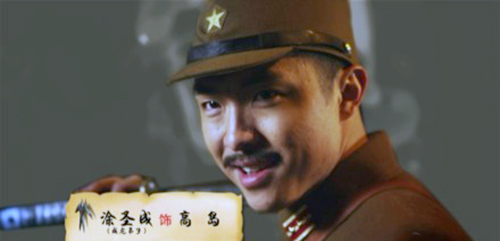
GC: What has been the most surprising aspect of being Jackie’s disciple?
JT: For me, there’s lots of pressure to be his disciple. Everybody thinks, “Oh you’re Jackie Chan’s disciple. You should do everything and you should know everything. You should jump off building without fear.” I did this film. Someone said, “Hey, you’re Jackie’s student. This is not too hard for you, right?” I look up. It’s like fifteenth floor. “You can drop down, right?” I said, “What’s down there?” He said, “It’s nothing, but there will be a wire supporting you.” (laughs) Yeah, I’m his student. But I’m not him.
But I still want to keep his spirit of being a stuntman and pure action. And also, I like creating movements for my own self. I don’t want to be like someone else, like Wushu, because an action director directed all these movements for all the actors and they all look the same. I always want to find new movements and new things in myself, so I can walk my own way. So they will be saying when they need some kind of special Kung Fu, they need this guy, this guy, this guy. So I don’t want to be fighting like Jet Li or fighting like Jackie Chan. I want to find my own way of martial arts.
GC: You say you want to preserve Jackie’s spirit. Jackie has had a lot of injuries, a lot of broken bones. How is your body holding up?
JT: It’s really good. It was from training. The training works. No big injuries.
GC: What’s next for you?
JT: Next there will be a few TV series. I find that movies in China, they don’t sell a lot, not a lot of viewers. But TV series, people will watch them every day. So there will be two or three more, and they will be action. And then, when I finish this TV series, lots of companies want me to do more for their new coming up TV shows. I want to take Chinese TV action to the next level.
Written by Gene Ching for KUNGFUMAGAZINE.COM
© COPYRIGHT KUNGFUMAGAZINE.COM, ALL RIGHTS RESERVED.
All other uses contact us at gene@kungfumagazine.com





